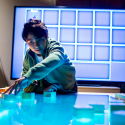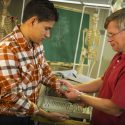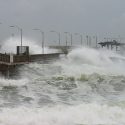UW-Madison welcomes students for summer graduate research experience
This summer, the University of Wisconsin–Madison will host 100 of the brightest undergraduate students in their fields from around the country to do graduate-level research with faculty members.
With the Summer Research Opportunity Program (SROP) — a program partially funded by the National Science Foundation — selected undergraduate students have the chance to receive individual attention from faculty mentors while participating in an in-depth research experience in their field of interest.
Ten individual programs are included within SROP, ranging from neurology and biology to engineering and education. Students participate in one of the 10 programs in their daily work with mentors, while participating in social activities with the students in the other areas of the program.
"I think the program is important because it provides students with the opportunity to do real research," says David Wassarman, a pharmacology professor at UW–Madison and a participating faculty mentor in SROP. "All the students who are in this program do not have the opportunity to do cutting-edge research at their own institutions, and through SROP, the students get to see how research is done and what graduate school is like."
During the nine-week summer program, students also attend workshops about preparing for the Graduate Record Examination, the graduate school application process and locating and applying for fellowships and other forms of funding for graduate studies.
Kat Barger-Seim dove into the fields of physics and astrophysics during the two summers she participated in the program. As an undergraduate student at Western Washington University, Barger-Seim had never worked in a university research lab before she came to UW–Madison to study. Barger-Seim’s experience in SROP was a deciding factor in her decision to attend UW–Madison for her Ph.D. in astronomy.
"After the program, I knew that I really wanted to come here," says Barger-Seim. "The program also allowed me to show the type of quality of work I can do and how driven I am and I showed [the faculty mentor] that I was the type of person he would want on his team."
Like many of the students involved in the program, Barger-Seim comes from a disadvantaged background. About 70 percent of the participants identify as minorities, while the other 30 percent tend to be from low-income families.
"We just try to give undergraduate students from around the country, as well as from Wisconsin, the opportunity to become involved in areas of research that are really leading the world, including the chance for hands-on experience," says Dorothy Sanchez, assistant dean of diversity programs for the UW–Madison Graduate School and a coordinator of the program.
The purpose of SROP is to encourage talented underrepresented students to pursue graduate study and academic careers. The importance of SROP’s continued exposure of minority students to exceptional research opportunities cannot be overstated, according to Wassarman.
"There has been this pressure on certain minority students to go on to certain professions. There aren’t enough role models in [the biological sciences] for underrepresented students, so we need to continue to expose students to what we’re doing at the UW."
Although the program is currently focused on the sciences, SROP is developing further to offer opportunities for students in the humanities in the future.
"All but one of our programs are in the STEM [science, technology, engineering and math] fields," says Sanchez. "We think it’s extremely important that humanities and the social sciences really be part of the SROP program.
"It is our hope that we ultimately create a pipeline to the UW," adds Sanchez, revealing one of the goals of SROP, in addition to serving the students who participate in the program.
A big part of achieving the goal of bringing more students to Madison is collaboration with directors of different programs around the UW.
"These directors are always thinking about the students, always working for the students in any way they can… [They] are uniquely positioned within their schools and colleges to make certain that diversity is brought into the summer programs and graduate programs. They are the best ambassadors that we have for these students to return to UW–Madison," says Sanchez. "[Our coordinators] are the wind behind the faculty’s sails."
Aside from the excellent faculty connection with the participants, the real excitement for the students is that, says Wassarman, hopefully "by the end of their time at the UW, [the students] have produced real data, encountering something that no one else ever knew."



